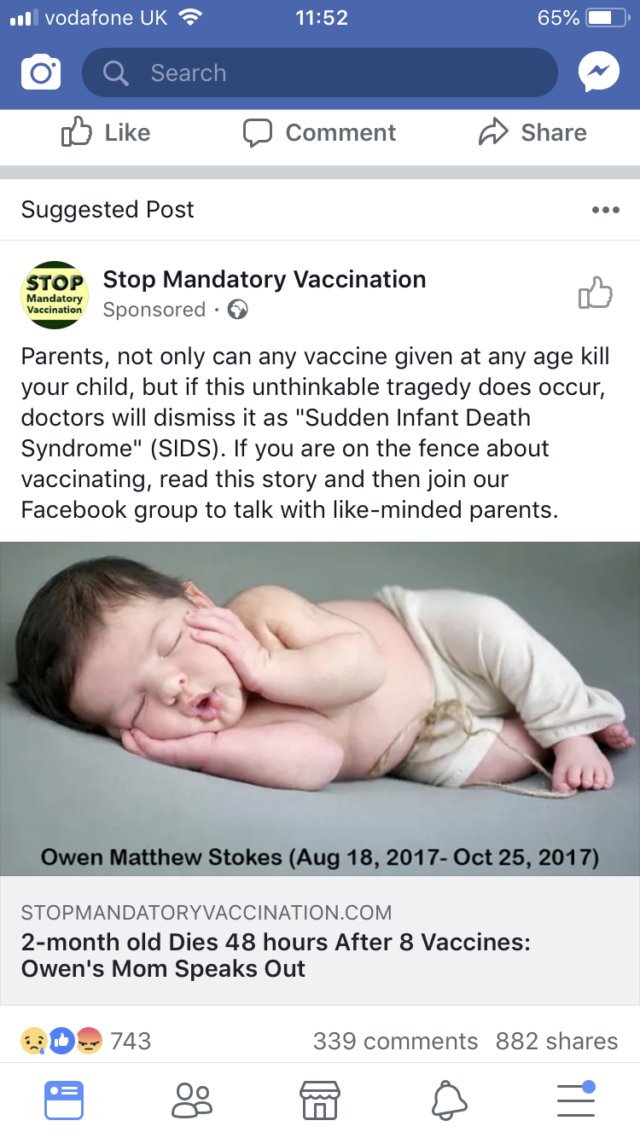Anti-vaccination advert banned
The Advertising Standards Authority ruled that the Stop Mandatory Vaccination ad on Facebook was unsubstantiated and misleading.

An anti-vaccination ad has been banned for claiming that all vaccinations could cause the death of children.
The paid-for Facebook post by Stop Mandatory Vaccination, seen on July 2, read: “Parents, not only can any vaccine given at any age kill your child, but if this unthinkable tragedy does occur, doctors will dismiss it as ‘Sudden Infant Death Syndrome’ (SIDS).
“If you are on the fence about vaccinating, read this story and then join our Facebook group to talk with like-minded parents.”

The post also featured an image of a baby with his eyes closed and the accompanying words: “Owen Matthew Stokes (Aug 18, 2017 – Oct 25, 2017), while text underneath read: “2-month old dies 48 hours after 8 vaccines: Owen’s Mom speaks out.”
A mother of a young baby who saw the post complained to the Advertising Standards Authority (ASA) that the ad was misleading and could not be substantiated and said the ad was likely to cause undue distress.
The Stop Mandatory Vaccination group, founded by author and “advocate for natural living” Larry Cook, provided the ASA with a document published by the Health Resources and Services Administration, a federal agency of the US Department of Health and Human Services, reporting the number of claims filed for compensation as a result of alleged injury or death caused by vaccinations and the amount of compensation awarded as part of the National Vaccine Injury Compensation Programme.
Stop Mandatory Vaccination said the ad’s image was of a sleeping baby, adding that they intended to cause parents some concern about vaccinations.
Upholding the complaint, the ASA said the evidence “did not demonstrate that all vaccinations were capable of causing death to children”.
It said readers would appreciate that the ad represented Stop Mandatory Vaccination’s own perspective, but would nevertheless understand from its definitive language that all vaccinations were proven to have the capability of causing death in children.
It said the data published by the US Health Resources and Services Administration showed that between 1988 and 2018 a total of 6,122 claims were compensated for injury and death alleged by vaccinations and 11,214 claims were dismissed.
The ASA said: “While we acknowledged that those figures showed that a large number of claims had been compensated in relation to alleged injury or death caused by vaccinations, we noted that the report stated that settlement was not an admission of liability and did not determine whether the vaccine had conclusively caused the injury or death.
“Furthermore, we noted that the report was only based on injuries and deaths to children in the US and did not cover the UK, where the data could be different.
“We considered that the evidence did not demonstrate that all vaccinations were capable of causing death to children.”
The ASA ruled: “Because we had not seen sufficient evidence that showed all vaccinations were proven to have the capability of causing death to children, we concluded that the claim ‘not only can any vaccine given at any age kill your child’ had not been substantiated and was misleading.”
The ASA said the image of the baby and reference to Sudden Infant Death Syndrome were likely to be distressing to readers and “were likely to cause fear or distress to readers, particularly parents who may be looking for factual information about the risks associated with vaccinations for children”.
It said: “Because we had not seen evidence to demonstrate that all vaccinations were capable of causing death in children, we concluded that the ad was likely to cause fear without justifiable reason in breach of the Code.”
It ruled that the ad must not appear again in its current form, adding: “We told Stop Mandatory Vaccination not to state or imply that all vaccinations could cause death to children unless they held sufficient evidence to demonstrate that.
“We also told them to ensure their marketing communications did not cause unjustifiable fear or distress.”





